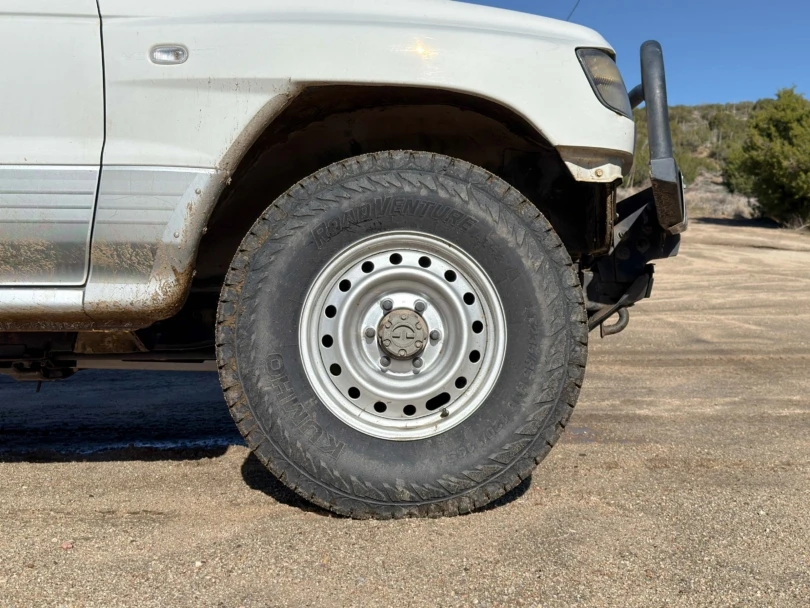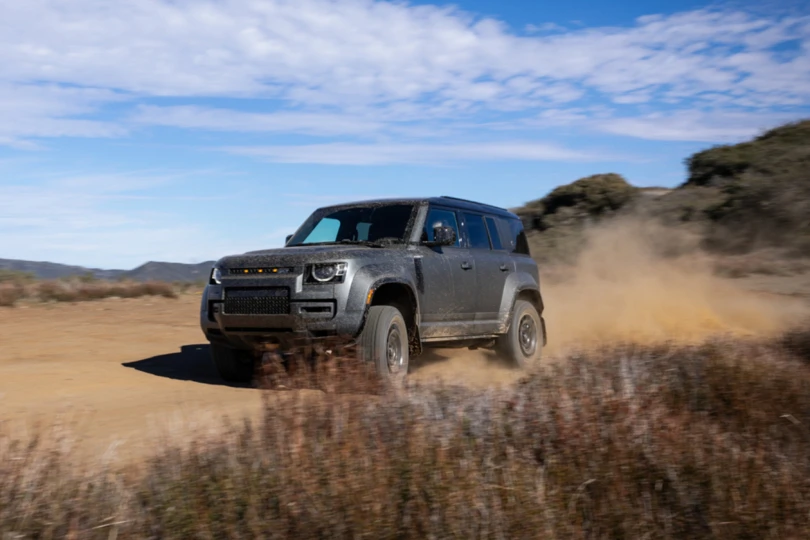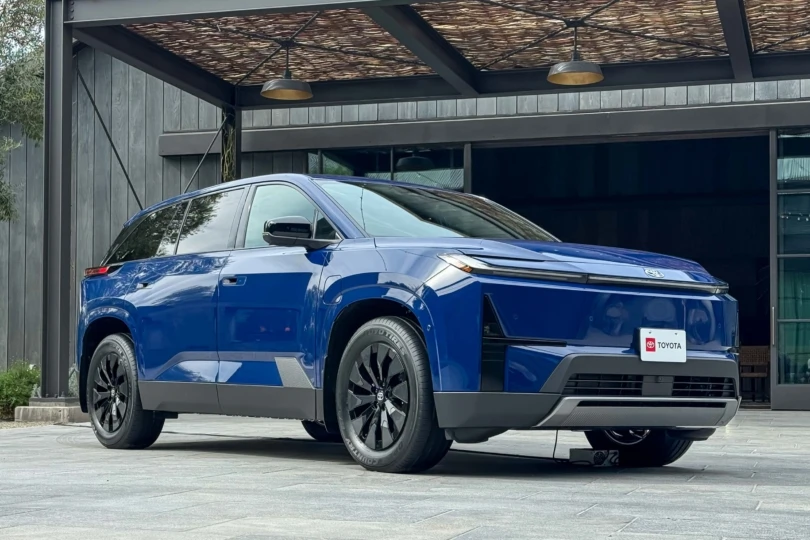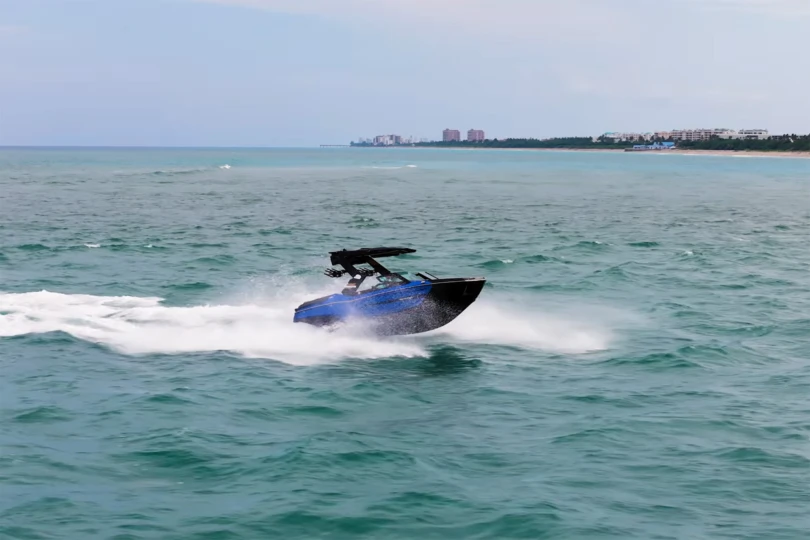“Overwatering” might not be an official phrase yet, like overlanding, but the idea of getting away from civilization is familiar to most adventurists. Now, there’s a watercraft built for multiday excursions, straight from the factory, that goes where boats can’t go.
The 2023 Sea-Doo Explorer Pro 170 is the first long-distance personal watercraft designed specifically for adventure. I had the chance to test one of these machines for 2 solid days of riding in Florida. I can confidently say Sea-Doo’s Explorer Pro 170 is the easiest, most comfortable thing I’ve ever ridden with handlebars. And it carries all your gear.
Although Sea-Doo offers 16 PWC models for the 2023 year, this review is for the 2023 “adventure-focused” Explorer Pro 170.
2023 Sea-Doo Explorer Pro 170 Review

Our 2-day, 150-mile trip took us from Fernandina Beach to St. Augustine and back. There were four machines captained by me, another journalist, Cyndi Martin, from Canada, a cameraman, Josh McWilliams, and Sea-Doo Media Relations Manager Tim McKercher.
We left the dock loaded with gear and full tanks of fuel. The first thing I noticed was the 900-plus-pound Sea-Doo felt light and responsive from the word go. Having previous experience riding snowmobiles, I thought it would feel heavy and difficult to maneuver. This wasn’t the case floating atop the Sea-Doo. I quickly increased my speed, which also upped the fun factor.

Our machines carried coolers filled with ice and hydrating drinks, along with an extra 4.4-gallon integrated fuel caddy. Other gear included tools, extra life vests, first aid items, and personal gear. Although we weren’t kitted out for sleeping overnight in the wild, there was still room left over for camping gear, thanks to the LinQ Multi Cargo Rack.
LinQ Storage System

Everything was firmly secured on board with the LinQ system. No tools necessary. The LinQ deck extension added 11.5 inches to the rear deck, allowing ample storage for multiday luggage.

Standard on all Explorer Pros is a 100L watertight LinQ bag that can be carried as a backpack. Riders can add other LinQ accessories to outfit their adventures, like a 4.2-gallon cooler and a 4.4-gallon fuel caddy.
These integrated fixtures make adventuring on a personal watercraft look sharp and less like a DIY project. In fact, until now, there has been nothing in the PWC category offering streamlined features for “overwatering” out of the box, like Sea-Doo’s Adventure Segment.
Long-Distance PWC Add-Ons

The Explorer Pro is comfortable for all-day riding. We lucked out with glassy waters on the first day, and only slight chop on Day 2. I’m not someone who can sit for long, yet I easily relaxed into the padded Explorer touring seat. I experienced no pressure points or other discomfort aside from later having to comb out my tangled mess of hair after I lost my hat.

Another adventure-specific consideration is the windshield — an industry first. Most of the time I was trying to look over the top, but the shield was nice for cutting early-morning chill and keeping wind noise at a minimum.
On frigid days, riders will appreciate this add-on, though it’s almost impossible to see through when covered in salty water droplets. The shield is also ideal for limiting wind fatigue — key for all-day travel.

A front bumper makes pulling rigs onshore and docking much easier and provides an ideal tie-down point.
Rider Positioning for Optimal Comfort

Adjustable handlebars allow riders to change position, standing or seated. You can even do this on the fly, in case you suddenly hit rougher water. When I telescoped the bars, I found the steering trickier when I was going slow.
We crossed under several bridges with “no wake” signs. As with anything with a powersport chassis, going slow means less momentum for keeping on track. With the bars raised, I was doing a lot more steering correction at 10 mph and under.
The deep footwells were exceptionally comfy, with loads of room. I can see longer rides causing folks with knee issues some discomfort, but on the Explorer Pro, it’s easy to straighten out your legs. I never noticed my feet slipping around on the grippy surface.
Adventure Comfort Features

The Sea-Doo Explorer Pro even comes with cruise control — great news for long-distance riders crossing open water or navigating a slow zone. I sadly didn’t realize this until the end of the trip, so didn’t get to put it to use.
A cup holder is placed in a convenient location for keeping water and other beverages close by. Hydration is key to all good adventures.
Heated hand grips, with five preset levels, are optional on the Explorer Pro 170. Luckily, the Florida sun shone brightly on our adventure and they weren’t needed.
Explorer Pro Tech Talk

Sea-Doo’s Explorer Pro 170 is fitted with a Garmin GPS/Fish Finder combo. On the clear 7-inch display, riders can view water depth. Sea-Doo provides a map token for downloading free regional maps. I enjoyed watching the water depth change as we rode along and was surprised at how shallow we could get with the machines.

A Wide Color Bluetooth Display is an optional add-on. With the BRP GO! App, you can plan your route, see where your friends are, and play tunes. As a music lover, this was one of my favorite features.
The BRP Audio delivers 100-watt, crystal-clear sound on an impressive stereo system. Pulling alongside Cyndi with her music blasting, I was struck by how well the Explorer Pro kept the music contained to her unit, instead of allowing it to reverberate off my surroundings.
We passed by many homes on our 2-day trip. I can imagine contending with loud tunes from passing watercraft and boats could get annoying.
Additional Storage Up Front

For quick-grab items like jackets, cameras, or snacks, there is a spacious 96L front storage container under the handlebars. In fact, there are two storage areas up front.
One is smaller and holds a cellphone in a waterproof, shockproof case lined with foam. The button to access this compartment is very easy to push for those of us constantly grabbing our phones to take photos. There is also a USB port in there, so your phone stays charged.
The second storage area requires two hands to push the levers. This raises the hood and handlebars, revealing the 96L space easily large enough for a 40L dry bag. This area is not waterproof, but it won’t get wet unless you flip over.
Speaking of Getting Wet …

I was grateful for how dry I stayed on the water. Even though it was Florida and temps were in the 80s, the Atlantic is cold. With windchill and ocean spray, I thought I’d be chilly, but I stayed dry and warm. The design keeps the wake well off to the side, and the windshield helped keep water spots off me and my sunglasses.
Sturdy & Stable With Style

I didn’t try this, but riders will be hard-pressed to roll an Explorer Pro 170. While I was spinning the ST3 hull around on the water, I felt totally stable — good when carrying loads of gear a long way.
The first time I hit the wake from a powerboat, I was a little more sideways than I wanted to be, but there was zero issue. The Explorer Pro is designed with a low center of gravity and kept me even-Steven, even when I found myself hauling ass through a confluence of swirling currents.

Getting on and off the PWC was worry-free due to its wider platform. I don’t want to guess Tim’s weight, but he’s not a small guy. I’m pretty sure I saw him standing on one side of his machine, without any concern for it rolling out from underneath him.
2023 Sea-Doo Explorer Pro 170: 900 Pounds of Pep

Carrying several pounds of extra gear at the tail did not make the Sea-Doo feel unruly up front. I didn’t get to experience how the machine felt unloaded, but I can’t say it was bogged down by any stretch. Maybe with another 50 pounds of gear on the tail, it would.
Based on the Sea-Doo ST3 deep-V platform, the PWC tracked nicely, resting squarely on the water. Although the Explorer Pro 170 is meant for long-distance water touring and is not Sea-Doo’s most playful option, it’s plenty sporty enough to get liftoff from full throttle, even in Eco mode.
Tim suggested I put it in sport mode and that was hair-back fun. When I asked if grabbing full throttle from stopped would launch me off the back, Josh said, “Not if you hold on!”

Cyndi and I also had fun creating wide, arching circles, and then narrowing them in for tighter spins. That was until I made myself sick. Nevertheless, I was surprised at how peppy the 900-pound PWC felt, even while carrying gear.
Sea-Doo Explorer Pro 170 Rotax Engine

The Explorer Pro uses a Rotax 1630 ACE engine. This powerplant includes an industry-exclusive closed-loop cooling system. This enhances performance by running at a consistent temperature and eliminating salt water or debris from clogging the internal cooling passages.
As a result, riders are reassured with a reliable, fuel-efficient PWC capable of extended rides. You can also go farther than any other watercraft with the option of bringing up to five additional LinQ system fuel caddies.
The naturally aspirated, three-cylinder, 170-horsepower engine is not as fuel efficient in Sport Mode as it is in Eco mode for obvious reasons. Again, the Pro is built to go the distance, not for endless start bursts or racing with your buddies. You could if you wanted to — just be prepared to lose fuel economy.
Intelligent Debris Free

Explorer Pro riders get a huge benefit with the Intelligent Debris Free (iDF) pump system. In other words, you don’t have to get in the water to clear a clogged intake. Instead, with the push of a button, the system backflushes, dislodging debris.
2023 Sea-Doo Explorer Pro 170 Features & Specs
Features
- Rotax 1630 ACETM – 170
- ST3 Hull
- Tech package: BRP Audio — Premium System, full-color 7.8-inch display & USB port (optional)
- iDF – Intelligent Debris-Free Pump System
- Garmin 7-inch touchscreen GPS & fish finder
- Touring windshield
- Heavy-duty front bumper
- Adjustable handlebar riser
- Explorer touring seat & knee pads
- Gunwale footrests
- LinQ Multi Cargo Rack
- Rear Deck Extension with second LinQ attachment system
- Ski tow eye
Specs
- Weight capacity: 3-person, 600 lbs.
- Range: 75 miles on less than one tank of fuel
- Fuel capacity: 18.5 gallons (87 octane)
- Dimensions (bumper to bumper): 146.8” L x 49.4” W x 55.5” H
- Drive Modes: Eco, Sport, Slow, Speed regulator
- Dry Weight: 859 lbs.
2023 Sea-Doo Explorer Pro 170: Things I Learned & Liked

One thing I noticed about the 2023 Sea-Doo Explorer Pro 170 in comparison to pretty much every other power toy I’ve played with: there was no fuel odor. I know some of you looove that smell, but it can be a bit much for hours on end. Not to mention it’s unhealthy.
Most of us want to breathe fresh air when outside and this machine didn’t get in the way of my deep breathing. I’m sure at least some smell was there, but it wasn’t wafting around me all day.

Aside from listening to my own playlist, my other favorite thing was “lift-off” in Sport Mode. If you pin it from a stopped position, you can go 0-60 in 5.9 seconds.
Sport mode does drink up the fuel fast, which isn’t conducive to riding far, but it’s ideal for a blast of power — and fun — every now and again. Or for when you want to take a friend wakeboarding, which is also possible with the ski tow eye add-on.
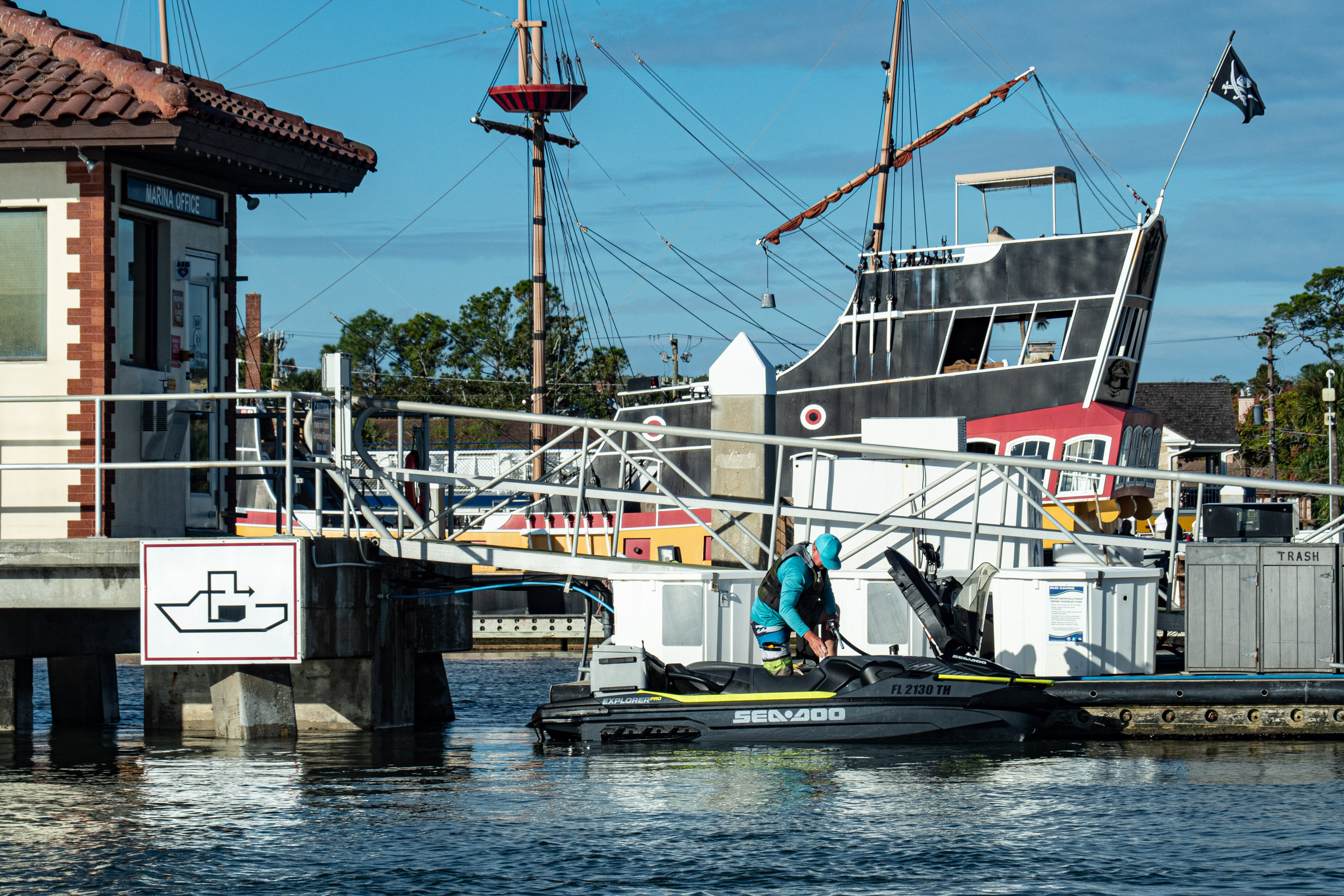
With all this fast-paced action, how do you slow the machine down and stop? Sea-Doo’s “intelligent brake and reverse” mechanism is perhaps one of the Explorer’s most intriguing additions.
To slow down quickly, I used the left-side handlebar lever, which engaged the brake and reverse system. When I was slow enough, the engine clicked into reverse. It reminded me of feathering the clutch and throttle on a motorcycle.
Some Cons I Found With the Explorer Pro
Overall, I was impressed with all the considerations that have gone into this adventure-focused model. I expected not to like it as much as I did, since there’s usually some amount of discomfort with handlebar sports.
I’ve already mentioned two things that were cons for me: the windshield, which I was often trying to look over, and the difficult steering when the handlebars are raised. The former had more positives than negatives, like cutting wind chill and limiting fatigue, so this might not be an issue for most. The steering is adjustable, so if you find the steering in the up position an issue, you can just keep the bars in the down position.
One concern I have with this machine is adding overnight camping gear — something I didn’t get to try — on top of the cooler, fuel caddies, and additional boxes of gear that were already loaded on my test machine.
I think adding this equipment in a duffel or similar on top of the lower boxes would work, but it might make the machine a bit top-heavy and create some real wind resistance as well. Not to mention how the extra gear might make it very difficult to access the gear in the lower cases, especially when out on the water.
Another negative might actually be the Sport mode, even though everyone wants this option in powersports. If there’s such a mode, you’re going to use it, right? And for the inattentive rider, forgetting to click back into economy mode, or just using Sport to get home faster, may mean getting stranded on the water out of gas.
2023 Sea-Doo Explorer Pro 170 Review: Wrapup

These days, most every adventurer is familiar with the term “overlanding.” Until now, there wasn’t anything out of the box for nimble long-distance water touring.
Fuel-efficient, with loads of storage, the 2023 Sea-Doo Explorer Pro 170 is not only capable of multiday rides, but it’s also comfortable. Whether you’re into wild camping on a remote beach or prefer your cross-water travels go from one portside hotel to the next, this personal watercraft has all the considerations necessary right from the factory.
It really feels like Sea-Doo built this watercraft around the rider, rather than an engine, like most vehicles. Everything’s in sight, everything’s easy to reach.
You can preorder a 2023 Explorer Pro 170 now from your local Sea-Doo dealer, which you can find on its website. These machines will begin shipping very soon and start at $16,799.



